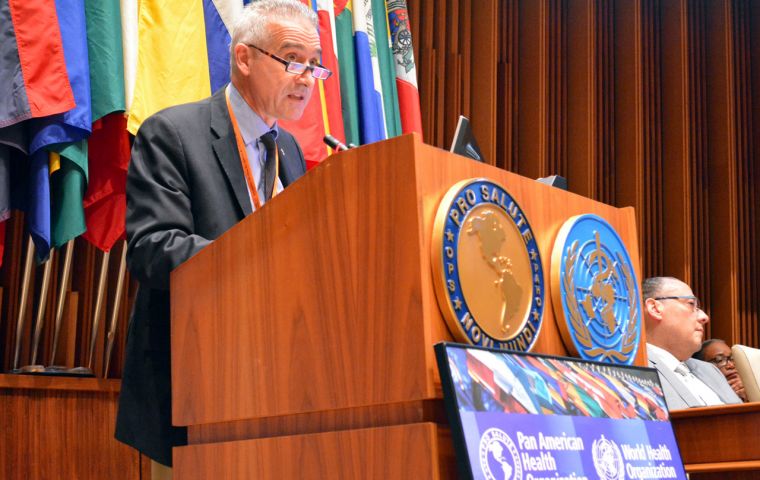MercoPress. South Atlantic News Agency
PAHO: Latin America still not safe from SARS-Cov-2
 LatAm still far from herd immunity, PAHO's Aldighieri warned
LatAm still far from herd immunity, PAHO's Aldighieri warned As restrictive sanitary measures are being gradually lifted worldwide, the Pan American Health Organization (PAHO) and the United Nations Educational, Scientific and Cultural Organization (Unesco) warned Thursday in Mexico City that things do not look so bright in Latin America regarding the Covid-19 pandemic.
Sylvain Aldighieri, PAHO incident manager for Covid-19, insisted the pandemic was not controlled at national, regional or state level and warned that “variants of concern are circulating in countries, in the American region or globally.”
“We expect outbreaks and situations of high transmission in many areas of the continent until entering 2022 or later,” Aldighieri explained.
He called people and health authorities not to rush into “assumptions of herd immunity.”
Aldighieri insisted the basis for this triumphalist vision was mass vaccination, which covers 60% of Mexico's adult population with at least one dose.
But “as long as there is community transmission in the countries, the pandemic is not tamed,” Aldighieri stressed.
“While vaccine coverage saves lives, we should not make public health policies with assumptions that we have or have not achieved a herd effect,” he added.
“In this context, PAHO recommends strengthening non-pharmacological preventive measures and invites the unvaccinated population to go to vaccination centers against Covid-19,” he explained.
PAHO Director Carissa Etienne said that Mexico has reported an increase in new infections, but “national data do not offer a complete picture and local trends remain worrisome.”
The organization's analysis, prepared with information up to June 20, also regretted that there has been “unequal access” to vaccines in the region.
UNESCO's “Covid-19 and vaccination in Latin America and the Caribbean. Challenges, Needs and Opportunities” report pointed out that sufficient coverage has not yet been reached in countries such as Mexico, Brazil, Argentina, Colombia and Peru,.
“Projections indicate that none of these five nations will achieve complete vaccination of 70% of the population before the end of 2021,” the document stated.
The study also underscored that many vaccination plans still do not contemplate the inclusion of children under 18 years of age. “Despite the scientific evidence from studies mainly carried out in adults, health authorities must analyze and consider scientific criteria of equity, and the principle of the best interests of children and adolescents to define the allocation of vaccines.”
Hence, Latin American health authorities “should consider children in vaccination plans” especially if “it is considered that, in several countries of Latin America and the Caribbean, especially in indigenous and Afro-descendant communities, population under 16 years of age exceeds 30%.”
The report also insisted that according to scientists, vaccinating 70% of the population should be a target, even in the absence of “certainty about the duration of protection” in view of the different variants of the virus.




Top Comments
Disclaimer & comment rulesCommenting for this story is now closed.
If you have a Facebook account, become a fan and comment on our Facebook Page!